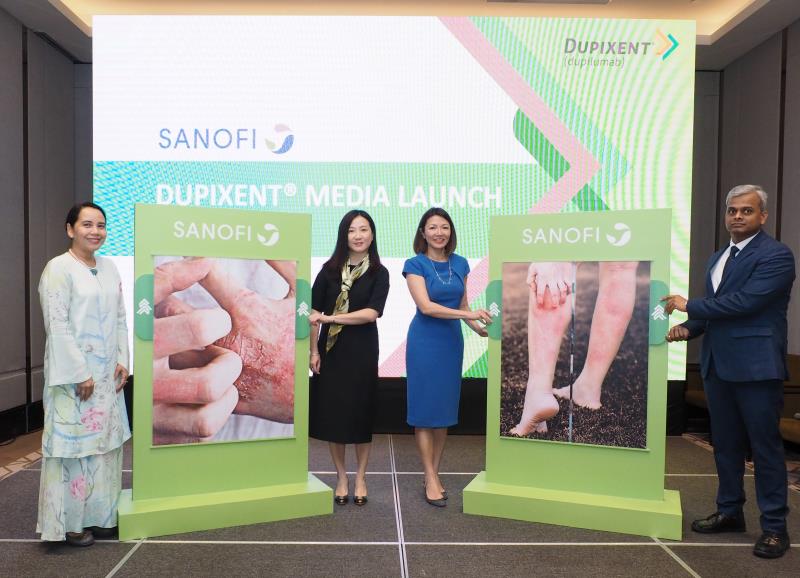 L-R: Dato Dr Noor Zalmy Azizan, Quek Wee Ling, Dr Bong Jan Ling and Dr Shiva Patil
L-R: Dato Dr Noor Zalmy Azizan, Quek Wee Ling, Dr Bong Jan Ling and Dr Shiva PatilThe new first-in-class monoclonal antibody dupilumab (Dupixent®, Sanofi) is now available in Malaysia. The agent is indicated for use in adults with moderate-to-severe atopic dermatitis (AD), whose disease is not adequately controlled by topical therapies or when those therapies are contraindicated.
According to Dr Bong Jan Ling, consultant dermatologist, many Malaysians suffer from AD. “Every day can be a challenge for people living with AD. This is especially true when you add lifestyle misconceptions and poor treatment adherence to the mix. The challenge is further magnified when one has a situation where patients are suffering from AD, with their current treatment not addressing their condition. When this persists, you’ll start to see a negative impact on quality of life because AD attacks on both physical and psychological levels. The multidimensional burden of atopic dermatitis can be pervasive throughout patients’ lives, trapping patients in a continuous cycle of disease and distress.”
Dato’ Dr Noor Zalmy Azizan, vice president of the Dermatological Society of Malaysia, said topical steroids are the mainstay of treatment in AD patients. However, proper adherence can impair its efficacy especially in people with moderate-to-severe AD. This leads to disruptions in sleep, increased anxiety, and depression symptoms, as a result of the disease.
Dupilumab’s approval in Malaysia demonstrates Sanofi’s commitment to bringing innovative treatments to patients living with moderate-to-severe AD, said Dr Shiva Patil, medical head of Sanofi Malaysia, Singapore and Thailand. “As a healthcare journey partner, we are committed to transform scientific ideas to therapeutic solutions in unmet needs of people suffering from debilitating diseases … Dupilumab helps a significant number of patients regain control of their lives by reducing bothersome signs and symptoms of AD. We are now focused on making this new treatment option available to people across Asia.”
Dupilumab is dosed in this manner: the patient is subjected to a loading dose of two 300 mL injections, and subsequently receives a 300 mL injection every 2 weeks. Each injection is priced at RM6,200 onwards and the treatment will cost upwards of RM75,000 annually. However, the patient support programme is already underway and is slated to begin in November. Doctors interested in enrolling their patients in the programme may get in touch with Sanofi for further details.
About dupilumab
Dupilumab is a biologic agent created using a technology known as Velocimmune®, a method of producing fully human monoclonal antibodies from immunized mice. The technology can overcome limitations of older platforms ‘by rapidly creating fully human antibodies that tightly bind to therapeutic targets and avoid potential immune responses that may occur in patients receiving antibodies that contain nonhuman (typically mouse) components’. [https://www.regeneron.com/technology Accessed on 22 November]
The molecule functions by inhibiting a receptor common to both interleukin-4 (IL-4) and interleukin-13 (IL-13). IL-4 and IL-13 are thought to be the drivers behind the persistent inflammation contributing to AD. Dupilumab’s approval by the European Commission was attributed to data from the LIBERTY AD* series of trials, which, in total, collected data from close to 3,000 adults living with AD. These include the LIBERTY AD SOLO 1 and SOLO 2, CHRONOS, SOLO-CONTINUE, and CAFE. The SOLO trials looked at dupilumab alone while CHRONOS and CAFE looked at dupilumab with concurrent topical steroid use.
LIBERTY AD: A Randomized, Double-Blind, Placebo-Controlled Study to Demonstrate the Efficacy and Long-Term Safety of Dupilumab in Adult Patients With Moderate-to-Severe Atopic Dermatitis